Leverage these 11 keywords & topics before they take off
What are people looking for on search engines? What are people talking about in groups on social media?
Here are 11 keywords & topics seeing amazing growth over the past month courtesy of Exploding Topics that savvy marketers should leverage before they take off.
1. Convertkit (keyword)
Convertkit is an email service provider with features and pricing that cater for online content creators (bloggers, YouTubers, illustrators etc).
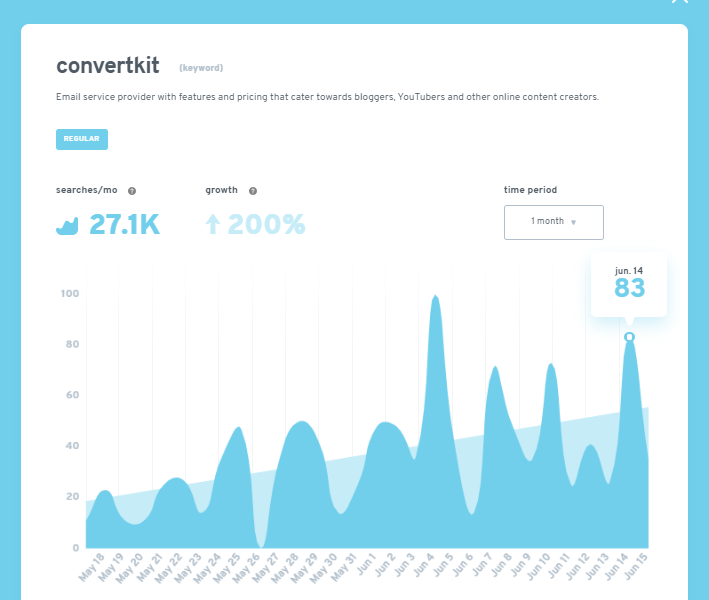
This service assures customers that they will spend more time on creating and less time on marketing. The provider’s positioning is well aligned with the creator economy, a new marketplace where people are making money by creating content and monetizing it.
Almost every social media platform has joined the content creation trend, from Facebook to Clubhouse, even Twitter! by launching programs to pay its content creators. Learn more here: 9 social media apps paying their content creators.
2. Heepsy (keyword)
Heepsy is an influencer-finding tool. Founded in Spain, it links brands to internet personalities in relevant niches.
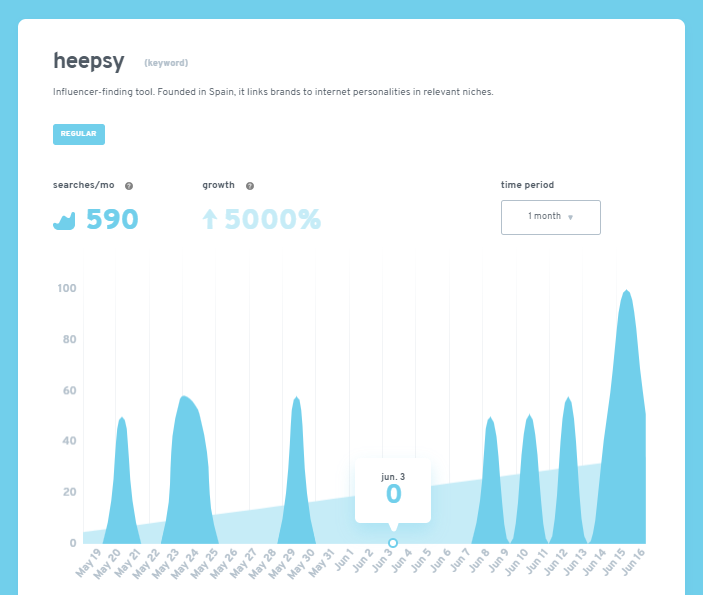
Influencer marketing is becoming one of the most important strategies used by marketers to drive brand awareness and sales.
According to eMarketer, 67.9% of US marketers from companies with 100 or more employees will use influencer marketing in 2021, up from 62.3% last year. In 2022, that figure will rise to 72.5%.
Is your company providing users with a similar tool or app? Are your customers looking for information on how to work with influencers? If they are, you could create content to answer their questions.
3. Growth hacking (topic)
A broad term used to describe a set of strategies designed solely for the purpose of increasing the growth of a company.
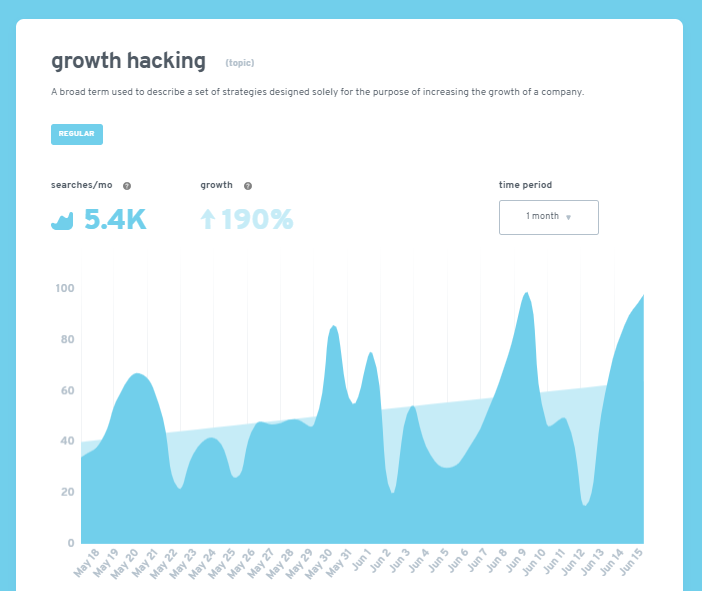
Take advantage of the increasing interest that people show for this topic and create content for growth hacking or growth hacking related keywords such as growth hacking marketing, growth hacking strategy, or growth marketing tactics.
Research the topic on Google or Answerthepublic.com.
4. Competitor analysis (topic)
Study of the strengths and weaknesses of potential business rivals.
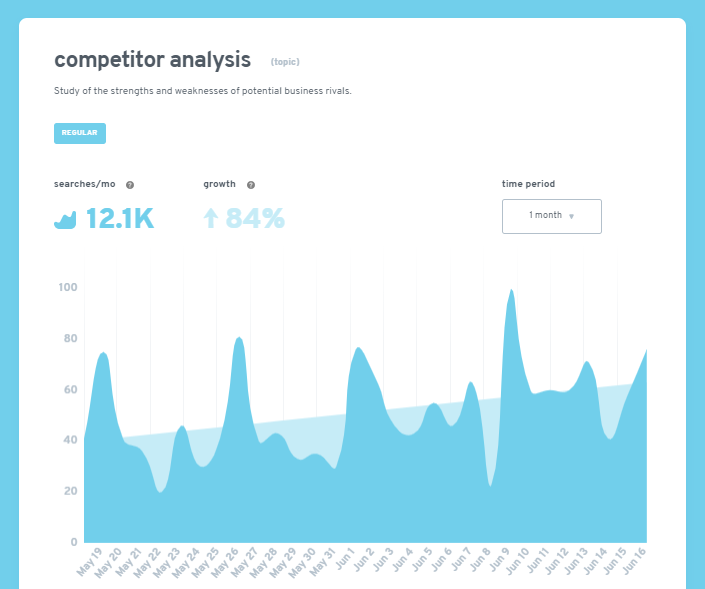
Wondering how to leverage this topic? If you market a competitor analysis tool, make sure to create content on this topic and related keywords.
It is possible to dominate a particular keyword with stellar content. The first two of 1,5 billion results for design template is Canva.
5. Explainer video (topic)
Short video, often animated, explaining a product or brand. Used for sales and marketing, typically either on a landing page or externally.
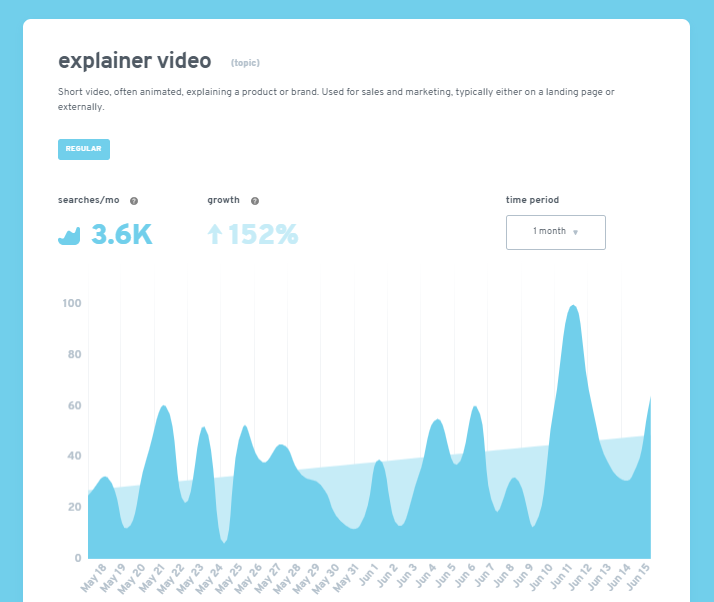
Do you provide video services? Are you a marketing agency?
Create content around the explainer video topic and its related keywords to leverage this increased search intent on Google.
6. Drop servicing (keyword)
Also known as “service arbitrage”, this is the digital equivalent of sub-contracting.
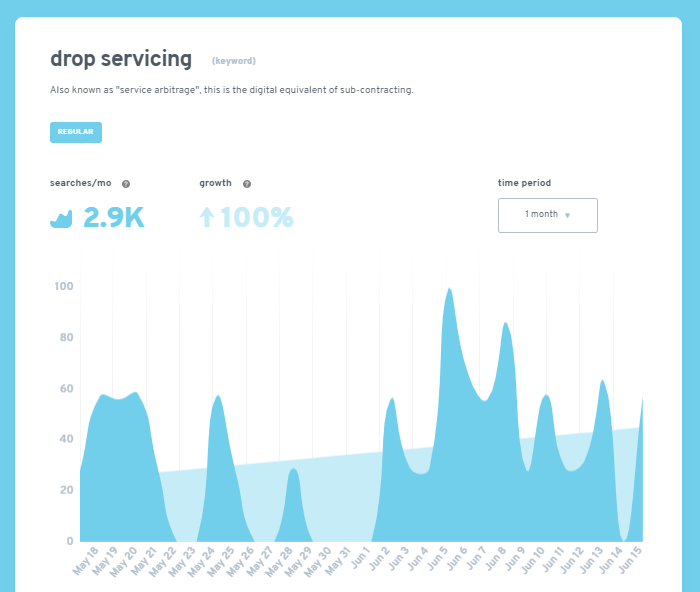
If you’re in the business of educating young entrepreneurs, creating content on drop servicing could be a good opportunity to increase website traffic.
Also, consider writing content that answers most questions like Is drop servicing profitable? How do I start a drop service?
7. Geru (keyword)
SaaS company that helps with planning and optimizing marketing funnels.
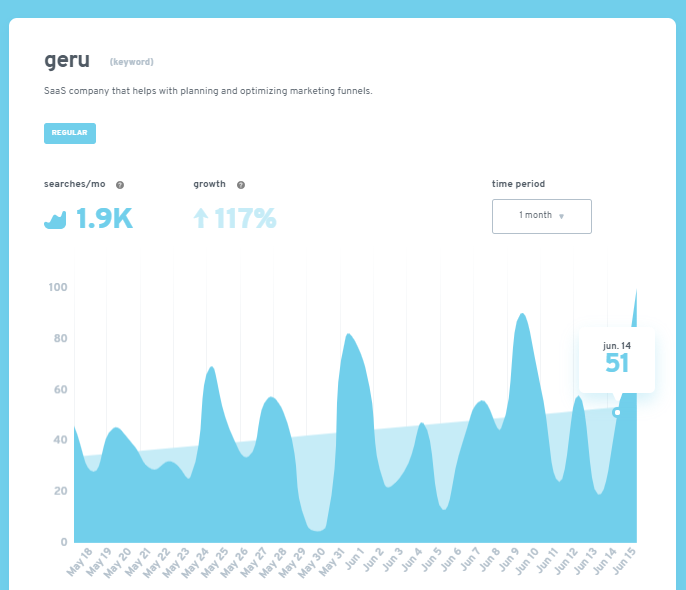
How can you increase website traffic or generate brand awareness if you provide similar services as Geru?
By creating a brand x vs brand y type of content where you highlight the differences between the two services and how your service benefits your customers.
8. Surfer SEO (keyword)
Data-driven SEO subscription service making recommendations for improving search rankings based on what is objectively working elsewhere.
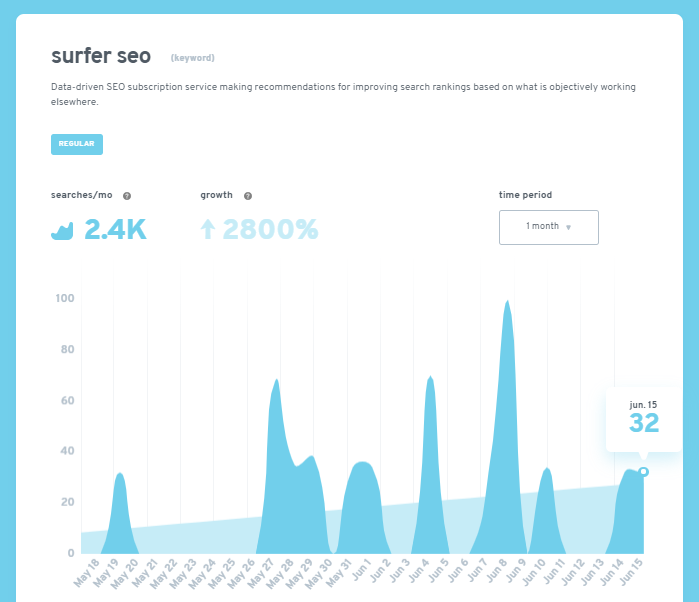
Every company with a website is competing to attract visitors from Google therefore Search Engine Optimization or SEO is one of the most searched for keywords.
Tools or platforms that provide businesses with recommendations on how to rank higher in search are in high demand. If you’ve had great results with your SEO strategy, share it in your content.
9. Designrr (keyword) EXPLODING
Software that turns blog posts and other forms of content into eBooks and Kindle books.
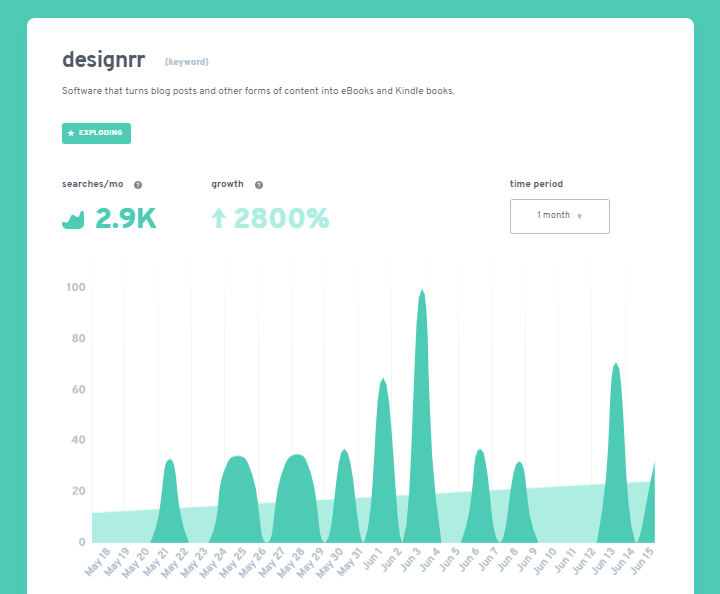
Doing content marketing is an amazing way to raise brand awareness and increase sales, but it’s a long-term strategy and resource consuming.
Any tool that can take one piece of content and reshape it into a different format is invaluable to small and medium businesses.
Let’s say you’ve struck gold with a traffic generating blog article. You can reach an entirely new audience by turning it into a video. Or a carousel on Instagram. Or a board on Pinterest.
Designrr is the latest talk of the town but you can also ride this wave by writing a blog article where you list other similar platforms besides Designrr.
10. Teachable (keyword) EXPLODING
Teachable.com is an online course creation and management software platform.
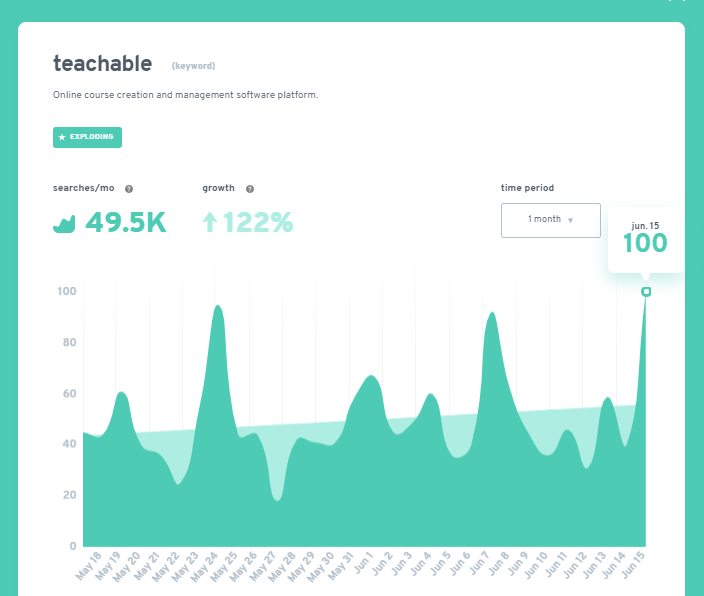
Why is the search for teachable exploding? We are now seeing a new economy growing exponentially: the creator economy.
Everyone has something to teach others.
Do you have a lush garden that you are dedicated to and work in every day? If you are willing to share knowledge, others are looking to learn from you.
Are you an experienced accountant? Small business owners are looking for specialists to teach them how to do their taxes.
If your customers are experts or specialists and are willing to teach others the tools of the trade, you could find ways to help them achieve this objective.
11. Voice search SEO (keyword)
The act of optimizing a website to include searches that are made using voice searches.
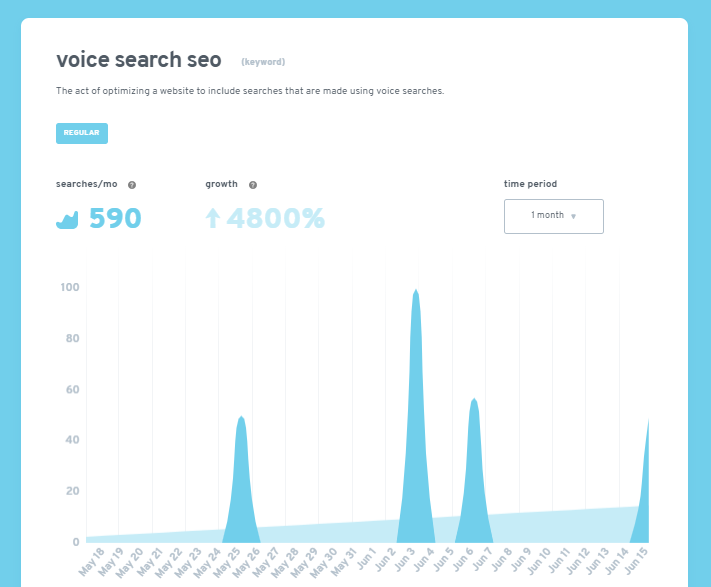
Amazon Echo dominates the digital assistant market at almost 70% followed by Google.
It’s no surprise that voice searches are increasing and interest in voice search SEO has grown 4800%.
vCommerce is the next stage of eCommerce designed to include voice shopping.
Voice is changing customer behaviour and business owners and marketers must adapt. Create content that teaches your customers how to optimize their website for voice searches. If you are a marketer, learn more about voice here.
Join the Conversation
We’d love to hear what you have to say.
Get in touch with us on our LinkedIn Page, Facebook Page, Twitter or TikTok.
SEO Strategies for 2019 from SEO experts Brian Dean and Eric Enge

Ranking on the first page of Google’s search results is every entrepreneur’s dream.
Here are 2019 SEO strategies from SEO experts Brian Dean and Eric Enge.
Brian Dean – How to rank 1st in Google search results – The Opportunity Keywords
Brian Dean is a widely-known SEO expert and the founder of Backlinko.com, one of the most valuable resources of SEO tips and tricks for many entrepreneurs and marketers.
Recently Brian managed to get his article on video SEO to rank #1 in Google search results. In an article following his success, he shows exactly how he did it. His article is thorough but quite lengthy. If you don’t have the time to read Brian’s article now, save it for later and read the following abridged version.
1. Find opportunity keywords
You’ve heard of keywords, but you’ve never heard of opportunity keywords.
Opportunity keywords are keywords with a high organic click-through-rate (CTR) which means a high volume of monthly searches yet a low number of competing pages. If you do keyword analysis (and you should!), look also for niche keywords.
If you don’t know how to find them, there are many resources on the web which provide you with a step-by-step process of unearthing opportunity or niche keywords so go ahead and google it.
2. Analyze Google’s first page
Now that you have found your opportunity keyword, go to Google and see what’s already working for that particular keyword.
Type the keyword into Google, scan the top 10 results and look for patterns.
What are the search results? Are they articles? Videos? What kind of articles: lists, guides, how-tos etc?
3. Create different content for your chosen keyword
Now that you know what type of content your competitors are feeding into Google, you can create content that is different than theirs.
Why?
Because your goal is to stand out and creating a different piece of content is a good way to draw attention.
If the search results consist of lists (i.e.: 5 gardening tools, 10 tips & tricks to improve your productivity, 3 dog breeds great with kids etc), consider writing a guide or publish a research report or curate statistics etc.
4. Create better content for your chosen keyword
If the content of your competitors is made of lists and you feel there is room for improvement than go this way.
An article with the title 100 recommendations to write great copy will beat the article that mentions only 10.
BuzzSumo implements this strategy on a current base. Here are two of the most successful articles published by BuzzSumo and you will see what I mean:
We analyzed 100 Million Headlines. Here’s what we learned (new research)
How to write engaging b2b headlines: analysis of 10 million articles shared on LinkedIn
5. Add a hook to get backlinks
Give your readers a good reason to share your content or link back to it.
Content that mentions statistics or other numbers represent a great source of information. So make sure your content includes statistics, graphs, research reports, e-books, guides, in-depth case studies etc.
Take a different approach to your topic, one that is fresh and different from anything else on the internet.
6. Focus on one specific result
To get backlinks (which are a contributing factor to Google’s ranking algorithm) Brian Dean recommends something else: that your content focuses on one specific result.
So instead of listing 20 results, write an in-depth piece of content which illustrates one result. Instead of writing one article which includes 20 results, write a piece of content for each result.
7. Content design
Now that you have gained the attention of your readers and had them click on your link, make sure you provide them with a pleasant reading experience.
Keep in mind that reading a piece of content on the web is not like reading a book; it’s more like reading a magazine.
So make it easier for your readers to consume your content by inserting paragraph headlines, high-quality images, illustrations, videos, screenshots, infographics etc.
Eric Enge – How to rank 1st in search results – The User Discovery Experience
Eric Enge is the founder and CEO of Stone Temple, a digital agency which was acquired last year by Perficient Digital. He was awarded 2016 Search Marketer of the Year and 2016 & 2018 Search Personality of the Year.
Are you familiar with this graph?
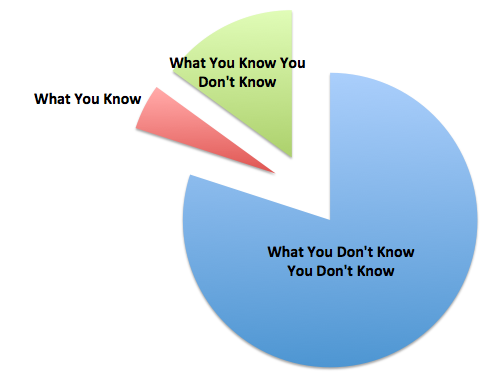
image source: steemit.com
Well, the Google user discovery helps people with the “stuff you don’t know you don’t know”.
It’s easy to search for a topic or subject you can name, but what about concepts, terms related to your topic of choice that you can’t name?
The name of a physical phenomenon or a movie. It’s like Shazam for music: when you come across a piece of song and you don’t remember its title or the name of the singer who performs it.
In recent months, Google increased its shift from being a search engine to a discovery engine.
Here is Eric’s explanation of the Google discovery engine:
Traditionally a search engine provides the user with a large number of links to web pages that might satisfy the user’s query. A discovery engine is more about helping users to find or explore things that they may not have been explicitly searching for, but which have a good chance of being of interest to the user.
The discovery engine relies on neural matching which is an AI method that connects words to concepts.
Google says neural matching impacts 30% of the queries. That is why we see search results that don’t include the phrase of the query but are related to it.
Discovery is not query-based; discovery is all about a journey–a user journey–while search is the quest for a single best answer. Winning businesses in the future will be high performers in both search and discovery.
Eric Enge
Join the Conversation
We’d love to hear what you have to say.
Get in touch with us on Facebook Group and Twitter.
How To Know If Your Webpages Are Keyword Relevant
More than ever any brand should want relevance and efficiency. Those should be words that stand out and make it count.
Therefore, when it comes to the online presence and how is your website performing, how do you know if the “Father” of all searches consider yours relevant or not? One of the best ways to see the ranking potential for a webpage is to see what it already ranks for. The first step is to pull the phrases you currently rank for. After having the basic ranking data, the next step is looking very carefully at the data and finding the additional keyword sets. To do this, you must focus on the phrases the site ranks for (in the top ten) and then count of all the individual words included with those keyword phrases. After looking for a certain phrase and seeing how your website ranks you must do the same search in the case of your competitors.
“Do you show up for a number of related phrases? If yes, then your target keyword is probably fairly possible for you to rank for, even if you don’t currently show up in the top 50 for that target. If you’re ranking for related words, Google at least sees you as being relevant,” explains Search Engine Land.
When the data appears to be in your favor and you are ranking for numerous related phrases, then it is relatively straightforward on how to proceed. According to webdetail, it will consist on tweaking some things, as you will need to improve your content to improve its depth. This includes the target page as well as any supporting content. It may be possible to conduct some public relations and link building in order to support your standing as a relevant source.
If you did not rank for many related terms, then your next steps are somewhat similar to tweaking. However, you will simply need to do so with more intensity. An overhaul will be necessary due to the fact that Google is not seeing your web pages as relevant to the keyword or topic. What this means is that the process will be more expensive and the results will take longer to appear. If you do not currently have the time or budget for something like this, then it may be wise to consider approaching a new target keyword,” added webdetail.com.
Here are some tips on how to boost your listing, according to Forbes.